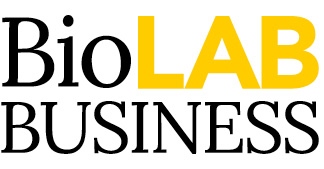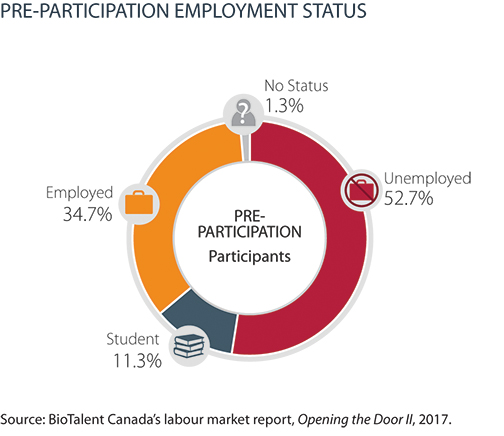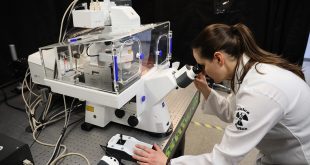By BioTalent Canada
For many biotechnology companies, the decision to hire a new graduate is often a tough one. Adding a talented, willing-to-learn member to the team builds capacity and can accelerate the achievement of business goals. But the cost of a new salary–and of integrating an inexperienced worker into the company–is often an obstacle.
Wage subsidies offer solutions for both biotechnology companies and new graduates by motivating employers to consider a talent pool they might have overlooked and helping young workers acquire the experience they need.
“Wage subsidy programs remain the most important programs BioTalent Canada provides to the bio-economy,” says Rob Henderson, President and CEO of BioTalent Canada. “They are certainly the most successful, because they alleviate the two largest pain points plaguing small- and medium-sized biotech companies: finding capital and finding talent.”
Since 2013, BioTalent Canada, a national non-profit HR association for the Canadian biotechnology industry, with the funding of Canada’s federal government, has injected more than $6.8 million into Canada’s bio-economy while helping 168 biotechnology companies hire more than 550 new graduates.
Employer feedback on the contribution of these young workers has been overwhelmingly positive. BioTalent Canada’s “MAGNUS Catalyst Award Top New Hire” award was created to recognize these talented young people.
“With the success of the wage subsidy programs, we feel it’s our duty to broadcast some of these great biotech success stories,” says Henderson.
MAGNUS Personnel joined BioTalent Canada as a title sponsor for the award. “We are thrilled to join BioTalent Canada in this initiative to honour these young professionals and highlight their achievements,” says Erik Simins, President and CEO of MAGNUS Personnel. “As a headhunting firm specialized in the medical, clinical research and life sciences sectors, we’re seeing first-hand the tremendous value that wage subsidy programs offer to the bio sector.”
A review panel of volunteers consisting of professionals from both the biotechnology industry as well as the public sector selected the winner and finalists based on their contribution to their employer.
This year’s MAGNUS Catalyst Award winner is Venkata (Teja) Nandamuri from RightBlue Labs in Toronto, ON. He will be awarded a cash prize of $1,000.
Nandamuri is a Senior iOS Software Engineer at RightBlue Labs, a company developing monitoring systems that reduce illness, injury, and burnout among athletes. Challenges and delays with the iOS version of RightBlue Labs’ app were jeopardizing its product launch and expansion into the US market. Nandamuri, with his contagious optimism, inquisitive mind and pride-of-work, dramatically increased RightBlue Labs’ production velocity, taking the development status of the iOS app from delayed to ahead of schedule. Through Nandamuri’s knowledge and dedication, he single-handedly created enhancements initially thought impossible to achieve within the available timeframe, positioning the company for a strong product launch in the US.
Wage subsidies have decidedly enabled small- and medium-sized biotechnology businesses like RightBlue Labs to hire new talent.
Ronen Benin, Chief Executive Officer of RightBlue Labs, agrees. “As a startup, capital efficiency is always top of mind, he says. “We knew that we needed an iOS developer, but budget was on the mid-end so we knew that a genuine rock star would be hard to attract. With BioTalent Canada’s wage subsidy, we were able to increase the base salary and as a result were able to find Teja. He turned out to be even more skilled and driven than we could have hoped for, so we’re absolutely thrilled. Applying for this subsidy is one of the best decisions we’ve made all year.”
The winner was selected from award finalists announced last month which also included Michael Domenichiello from PriMed Instruments in Mississauga, ON, and Alysha Law from eSight Eyewear in Toronto, ON.
Domenichiello is a Quality Assurance Technician at PriMed Instruments, a developer and manufacturer of medical devices related to flexible endoscopy. His dedication, professional attitude and willingness to take on new challenges have helped PriMed bring its medical devices to market sooner and expand into new foreign markets previously not available to PriMed.
Law is a Vision Advocate at eSight, the company that has developed a technology that allows the legally blind to actually see. She recognized that while there is high demand for eSight’s electronic glasses, accessibility and affordability is a prevalent barrier. With her willingness to tackle major challenges, Law contributed to what has now become eSight’s Affordability Initiative.
Employers emphasize the significance of wage subsidies.
“Through wage subsidies, we were able to recruit and retain much needed talent to help a small company like ours to become a key player in the global market,” says Dong Ly, Manager of Regulatory Affairs and Project Development at PriMed Instruments.
Abbas Damji, Chief Financial Officer of eSight also sees the benefits from the new graduates’ perspective. “The Career Focus wage subsidy program allows new hires to accelerate their transition into the workforce.”
On average, new graduates typically stay about six months on wage subsidies, after which almost 85% keep full-time employment, according to BioTalent Canada’s research.
Having placed more than 800 new graduates into jobs since 2005, BioTalent Canada has a long track record of working with the government of Canada to help the bio-economy access talent. As a liaison between stakeholders like biotechnology companies, academia and the public sector, BioTalent Canada continues to advocate for funds to facilitate hiring, and accelerate new graduates’ transition from academia to the workplace.
BioTalent Canada has published a labour market report on youth employment based on data collected from the Career Focus wage subsidy program. To view or download a copy of the full report, visit biotalent.ca/newgrads2
 BioLab Business Magazine Together, we reach farther into the Canadian Science community
BioLab Business Magazine Together, we reach farther into the Canadian Science community






